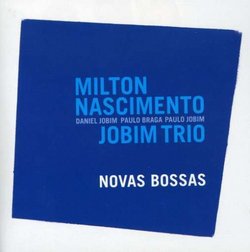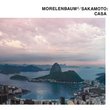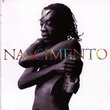| All Artists: Milton Nascimento, Jobim Trio Title: Novas Bossas Members Wishing: 0 Total Copies: 0 Label: EMI Brazil Original Release Date: 1/1/2008 Re-Release Date: 12/1/2008 Album Type: Import Genres: International Music, Pop, Latin Music Styles: South & Central America, Brazil, Latin Music, Samba Number of Discs: 1 SwapaCD Credits: 1 |
Search - Milton Nascimento, Jobim Trio :: Novas Bossas
 | Milton Nascimento, Jobim Trio Novas Bossas Genres: International Music, Pop, Latin Music
|
Larger Image |
CD DetailsSimilar CDs
|
CD ReviewsCopied from Jim Fusilli of the Wall St Journal J. Loewer | East Aurora, NY USA | 10/08/2008 (5 out of 5 stars) "Review in Wall Street Journal, Oct 8, 2008 Antonio Carlos Jobim once asked Milton Nascimento to record a collection of his songs, a project that would have brought together Brazil's most revered composer and one of its best-known singers. Jobim, who was known as Tom to friends, died in 1994 before the project could proceed, and in a sense "Novas Bossas" (Blue Note) is Mr. Nascimento's fulfillment of his late friend's request. He recorded it with the Jobim Trio, which includes Jobim's son Paulo, a guitarist, and grandson Daniel, a pianist. The drummer is Paulo Braga, a member of Tom Jobim's band before the trio formed. But the album is more than a Jobim tribute, Mr. Nascimento told me through a translator when I called his home in Rio de Janeiro. "The original idea was to do Tom's songs," he said, "but Paulo and Daniel wanted to do my songs too." The musicians gathered at Mr. Nascimento's home, played in his living room, and then retreated downstairs to his studio to record. "We were just coming up with ideas," he recalled. "It was natural and spontaneous. The way I like to work most, and I do it all my life, is to work with a lot of people and to express openness in arrangements and the selection of the repertoire." In this case, he added, "it was special from the beginning, being together with Tom's son and grandson." "Novas Bossas" celebrates the 50th anniversary of bossa nova, a cooler, harmonically intricate sibling to samba. "Canção do Amor Demais," a 1958 collection of songs by Tom Jobim and Vinicius de Moraes sung by Elizete Cardoso with João Gilberto on guitar, is considered to be the first bossa nova album. On the new disc, Mr. Nascimento and the trio cover "Chega De Saudade" and "Medo de Amar" from the Cardoso sessions. Also, a new version of "O Vento" honors its composer, Dorival Caymmi, who died in August at age 94. Mr. Nascimento also revisits songs from his storied career on the new disc. Two tracks -- the album's opener, "Tudo Que Voce Podia Ser," and "Cais" -- appeared on Mr. Nascimento's breakthrough recording, "Lo Borges Clube Da Esquina," released in 1972. The Nascimento-Fernando Brant composition "Tarde" was featured on "Native Dancer," the singer's 1974 collaboration with saxophonist Wayne Shorter that helped introduce Mr. Nascimento to American audiences. The new versions make it clear that his miraculous voice has lost none of its power and charm. "The way I like to work most, and I do it all my life, is to work with a lot of people and to express openness in arrangements and the selection of the repertoire." Milton Nascimento That voice, and the easy camaraderie among the musicians, was on display at the Knight Concert Hall here on Saturday, the opening night of a U.S. tour that runs through month's end. Bassist Rodrigo Villa -- "our adopted son," Mr. Nascimento called him, "the fourth of our trio" -- aided the group, which opened the program with several Jobim standards: "Samba de Uma Nota Só," "Corcovado" and "Águas de Março" (known to American pop and jazz audiences as "One Note Samba," "Quiet Nights of Quiet Stars" and "Waters of March"). Like Thelonious Monk's compositions, Jobim's songs are so familiar and distinct, they are more easily identified by their melodies than by their titles. Wearing a Panama hat, Daniel Jobim demonstrated a spry facility on the piano, while his father, seated to his left, was in the Gilberto role, adding rhythm and color on the nylon-stringed guitar. The band played with such quietly casual dexterity that it seemed it might be unable to fill the hall's vast space -- until Mr. Nascimento arrived. He entered midsong, a star turn, strolling and singing as if he happened upon the group. The 65-year-old is a bit portly now and favors sunglasses and that Rick James hanging-but-inert hairstyle, and once he reached center stage, he didn't move much for the first few numbers, alternately playing chords on an amplified acoustic guitar or simply singing, though there's very little that's simple about Mr. Nascimento's approach to song. His voice is remarkably elastic, and he moved from the bottom of his range to the top in an instant. Or he began a song with a plaintive cry in falsetto, then swooped down to his midrange and settle in. On this night, though the evening concluded with several of his rock-influenced songs, he seemed content to be a member of the band: During "Brigas Nunca Mais," he retreated to a high stool, sat, crossed his arms and listened as Daniel sang the first verse. Then he came downstage and joined in gently to add to, rather than take over, the melody. On the ballads, the group found the level of romantic intimacy it conveys on the album; in a less formal setting, "Caminhos Cruzados" might have encouraged slow dancing in the aisles. During the bouncy "Chega De Saudade," Mr. Nascimento spun to face Mr. Braga, who had an extraordinary night behind the drum kit, and did a little two-step. The moment seemed to liberate him, and he grew more animated as the concert went on -- at one point, he strolled in tempo from musician to musician, dropping a hand on their shoulders, delighting in the friendly interplay. When he introduced the guitarist, who had given the music its flexible spine throughout the show, Mr. Nascimento proclaimed, "Everything is good with Paulo Jobim, but the best is his smile." Moments later, he sat next to Daniel Jobim and played a bass line on the keys as the pianist soloed. Mr. Nascimento has known Daniel forever -- he told me he dedicated a concert to him when he was 3 years old "and the boy never forgot." When their brief duet ended, Daniel beamed. Prior to the first encore, Mr. Nascimento was surprised with a ceremony in which he was given the key to the city of Miami. Respectful applause followed, surpassed by demands for more bossas and more Milton Nascimento. Mr. Fusilli is the Journal's rock and pop music critic. " Best One From Milton In Awhile bluejim | San Leandro, California United States | 10/06/2008 (4 out of 5 stars) "These musicians have obliterated the various boundaries of Brazilian music (MPB, Samba Cancao, etc.) to create something "beyond category". Milton uses his trademark falsetto less and less as he gets older but trots it out here fairly often to wonderful effect. This is non-gimmicky music to the point where it's almost too simple at times but they do throw in a couple of production twists here and there to keep things interesting. Some of the endings seem a little abrupt but on the whole, well done, Guys. Can't wait to see you in November. " Bosa Nova revisited Brendan X | Eastern Shore, MD | 11/11/2008 (5 out of 5 stars) "I liked it when the Bosa Nova first came out. To hear it again in a new, fresh way is very rewarding.
" |

 Track Listings (14) - Disc #1
Track Listings (14) - Disc #1



